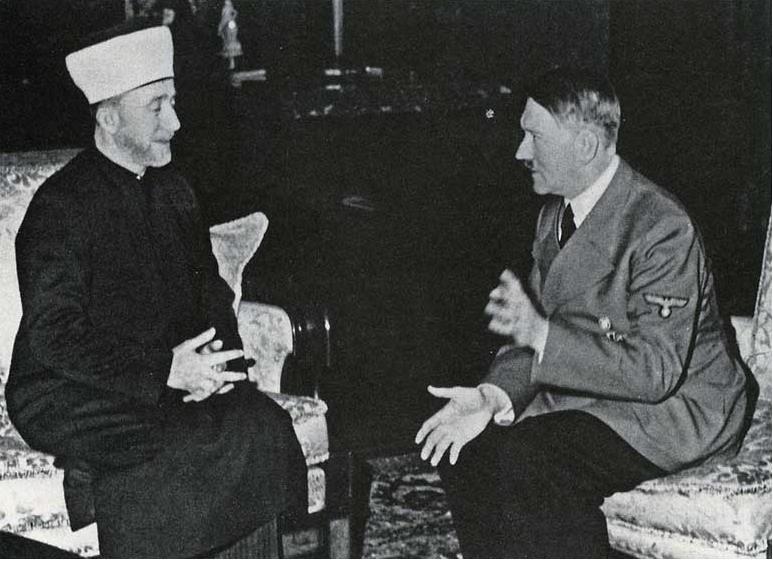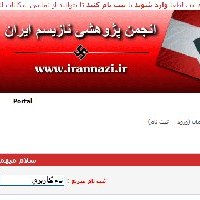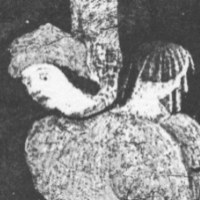![]()
Thursday, October 22, 2015 | Edited: Friday, October 23, 2015 | By Rob Harris
Israeli Prime Minister, Benjamin Netanyahu, has been harshly criticised in recent days for highlighting what he believes to be the role of Haj Amin al-Husseini, the Grand Mufti of Jerusalem during the British Mandate era, in encouraging the initiation of the most destructive phase of the Holocaust. The position of Grand Mufti affords the highest authority on religious law in Sunni Muslim nations.

The Mufti of Jerusalem Haj Amin al-Husaini meets with Adolf Hitler, November 28, 1941. Haj Amin al-Husaini was a war criminal whose collaboration with Adolf Hitler played a key role in the “Final Solution.” The Mufti was instrumental in the decision to exterminate the Jews of Europe.
During a speech at the 37th World Zionist Congress in Jerusalem this week, Netanyahu claimed that Hitler originally intended to expel European Jews but changed his mind due to the influence of al-Husseini. The Mufti argued that the expulsion of the Jews would lead to their migration to Mandatory Palestine, which he had a leading role in violently opposing. Netanyahu stated that Hitler was persuaded to exterminate Europe’s Jewry at a meeting between the two men in November 1941.
The claim has been widely criticised. Some elements in the media presented Netanyahu as somehow making trouble, for example RTE titled its article on the controversy: “Netanyahu provokes Holocaust row” when in fact the Mufti’s relationship with Hitler was only referred to briefly in the speech. The thrust of criticism concerned Arab-Palestinian incitement from the Mufti’s era to the present, which media outlets ignore.
Fatah-PLO lambasted Netanyahu’s comments, unsurprisingly perhaps, given al Husseini’s heroic status in Arab-Palestinian society. Carlos Latuff, an illustrator who deals in anti-Israel propaganda, mocked Netanyahu over the episode. Latuff makes near-continual use of Holocaust imagery to demonise the Jewish State’s role in the Israeli-Arab conflict.
Moshe Zimmermann, of Jerusalem’s Hebrew University, went as far as to argue that Netanyahu is a Holocaust denier:
“Any attempt to deflect the burden from Hitler to others is a form of Holocaust denial”
Such a charge is a nonsense since Netanyahu didn’t deny Hitler’s responsibility for the Holocaust. Holocaust Deniers deny that the Holocaust occurred, suggest there was no intent to exterminate European Jews, or minimise or relativise the dimension of the episode by presenting it as a fairly typical genocide for the period. The term is not used for those who argue that Hitler may have been influenced by other allied elements.
Associated Press failed to note that Moshe Zimmermann has a record for applying offensive Holocaust terminology to Jewish political opponents. He described Hebron’s Jewish children as ‘Hitlerjugend’ (Hitler Youth). Such behaviour is often deemed to be objectionable since it trivialises the scale and cruelty of the Holocaust. Thus, it is most peculiar for Associated Press to claim that Zimmermann is a prominent expert on anti-Semitism. His expertise in fact focuses on German history, propagandist and is regarded as one of the most extreme anti-Israel propagandists in Israeli academia.
Netanyahu later clarified that he had no intention of absolving Hitler of his responsibility for the extermination programme but wished to highlight “the role played by the Mufti, Haj Amin al-Husseini, a war criminal, in encouraging and goading Hitler, Ribbentrop, Himmler and others to exterminate European Jewry.”
Associated Press wrote that unnamed historians disagreed with Netanyahu’s claim of the Mufti’s role:
“Historians quickly noted that the Nazi Final Solution was already well underway at this point, with several concentration camps up and running. Hitler had previously repeatedly declared his lethal intentions for the Jews.”
Such claims are not in keeping with the known timeline of the Holocaust, and also conflates the nature of concentration camps. There were concentration camps in NAZI Germany going back to the middle 1930s but they were not extermination camps. Camps with the principle purpose of committing mass murder are known to have only been built after the Wannasee Conference of January 1942, which marked a major turning point in the Holocaust.
Hitler had indeed declared a lethal intent towards the Jewish race, such as in a January 1941 speech but it was clearly a threat of extermination should war spread internationally. Hitler’s private speech to Nazi Leaders 20 days after his meeting with al-Husseini attests to his wish for extermination to finalise the ‘Jewish Question’. It is important to note that this was after war had spread to the United States and the USSR. Hitler appeared to believe that powerful international Jewish financiers were out to destroy the Reich and the Germanic people. His stance may have been propagandistic but the NAZIs projected many of their own character defects upon a notional Jewish collective which was described as genocidal in intent.
There is no consensus among historians as to when NAZI Germany decided upon extermination rather than a mix of expulsion, starvation and genocide. Arguments tend to vary, favouring the middle of 1941 or closer to the end of 1941 as the turning point in this horrific episode. Critics might argue that Netanyahu pointed to a specific meeting as turning Hitler’s opinion toward extermination rather than expulsion. However, it appears to be incorrect to point to the existence of genocidal methodologies prior to al-Husseini’s visit, as a refutation of Netanyahu’s stance.
It is worth noting that an expulsion strategy was adopted at the time as a solution to the ‘Jewish Question’. Mass genocide was systematic in the newly NAZI-occupied areas of Eastern Europe which had an immensely destructive impact on the regional Jewish populaces but this strategy does not appear to have been envisaged as the primary solution for ending European Jewry’s presence. Professor Peter Longerich, a scholar of the Holocaust, argues that it is difficult to place the exact date of transition toward a programme of pure extermination:
“In mid-1941, Hitler ordered the deportation of Jews from the Greater German ‘Reich’ to Eastern European ghettos. Ten thousand German Jews were sent to Lodz, Minsk and Riga between October 1941 and February 1942. From March 1942 they were deported to ghettos in the Lublin district. Hitler was thus putting into practice his plan, developed at the start of 1941, to deport the Jews to occupied Soviet territories. But he did not wait for his original precondition to be fulfilled — military victory over the Soviet Union’s Red Army.
In autumn 1941, the Nazi regime extended the policy of mass murder to areas outside the Soviet Union. In so doing they drew on experience gained from the defunct T4 ‘euthanasia’ programme. From this point, fixed and mobile gas chambers were to be used to murder Jews. At Chelmno, from December 1941, specially adapted buses (Gaswagen) were used for this purpose. In March 1942, Belzec extermination camp went into operation, killing Jews from Lublin and Galicia.
The exact date on which the leadership of the Nazi regime decided to convert the as-yet-unplanned intention to exterminate all European Jews into a concrete programme is not documented and is still the subject of controversy among historians. It is likely that it was not the consequence of a single decision, but of a longer process.”
A multifaceted strategy for resolving the “Jewish Question” was not novel. Konstantin Pobedonostsev, a leading Russian political figure of the late 19th Century, famously remarked on what he saw as the desired fate of the then three-million Jews living in Imperial Russia: “one-third will die, one third will leave the country, and the last third will be completely assimilated within the Russian people.”
Al-Husseini was in contact with the Third Reich since 1933, and testimony, such as that of Eichmann’s assistant, Dieter Wisliceny[1] establishes that he had a role in encouraging a Holocaust extermination programme, rather than expulsion as a means for Hitler to be rid of the Jewish people:
‘Adolf Eichmann’s deputy, SS-Hauptsturmführer Dieter Wisliceny, stated at his Nuremberg trial that “in my opinion, the Grand Mufti, who has been in Berlin since 1941, played a role in the decision of the German government to exterminate the European Jews, the importance of which must not be disregarded. He has repeatedly suggested to the various authorities with whom he has been in contact, above all before Hitler, Ribbentrop and Himmler, the extermination of European Jewry. He considered this as a comfortable solution for the Palestine problem.”’
Andre Steiner also relayed a conversation with Wisliceny in Bratislava, June 1944:
When acting as adviser on Jewish affairs to the Slovakian government, Wisliceny is believed to have said that “the Mufti was one of the instigators of the systematic extermination of European Jewry and was a partner and adviser to Eichmann and Hitler for carrying out this plan.” (Bratislava, 1944 — citation from the book “Israel: The Will to Prevail,” by Danny Danon, 2012).
Some prominent historians have cast doubt on the accuracy of Wisliceny’s statements however, arguing that the timelines suggest the Mufti’s meeting with Hitler came too late, although Wisliceny suggests that al-Husseini influenced other members of the Third Reich as well.
Bernard Wasserstein’s book ‘Britain and the Jews of Europe, 1939-1945’, asserts that the Third Reich precluded Jews being allowed to emigrate to British-Mandatory Palestine due to the NAZI alliance with the Mufti — in March 1941, Hitler agreed to this condition, and a few months later the Nazis ended the legal emigration of Jews from German-ruled areas, for which they often extorted substantial sums of money.
During 1941, leading NAZI members were advocating the deportation of Jews to the USSR, to free up space for German citizens. Hitler finally agreed to the proposal at the end of September 1941. At some point between October and December, NAZI policy would crystallise into an approach constituting of extermination solely. Little wonder that some historians believe that the Mufti’s visit was a pivotal moment in the Holocaust.
The book ‘Nazis, Islamists, and the Making of the Modern Middle East’, authored by Wolfgang G. Schwanitz and Barry Rubin, points to Hitler being open to emigration as a solution to the “Jewish Question” in 1941. The book vividly illustrates (see pages 20–22) the influence that the Mufti brought to bear in helping initiate a mass extermination programme, albeit a contention that is controversial amongst other historians:
“Hitler had to decide precisely how “the very last” of the Jews were to leave Germany. As late as 1941, Hitler thought this could happen, in the words of Hermann Göring in July, by “emigration or evacuation.” Yet since other countries refused to take many or any Jewish refugees, Palestine was the only possible refuge, as designated by the League of Nations in 1922. If that last safe haven was closed, mass murder would be Hitler’s only alternative.
The importance of the Arab-Muslim alliance for Berlin, along with the grand mufti’s urging, ensured that outcome. And al-Husaini would be present at the critical moment Hitler chose it. In November 1941, al-Husaini arrived in Berlin to a reception showing the Germans saw him as future leader of all Arabs and Muslims, perhaps even reviver of the Islamic caliphate. […]
When the day of German victory came, Hitler continued, Germany would announce the Arabs’ liberation. The grand mufti would become leader of most Arabs. All Jews in the Middle East would be killed. […]
A few hours after seeing the grand mufti Hitler ordered invitations sent for a conference to be held at a villa on Lake Wannsee. The meeting’s purpose was to plan the comprehensive extermination of all Europe’s Jews.”
The question is one of intentionality. Holocaust deniers would like to believe that Hitler and the Third Reich did not possess the most murderous ambitions toward the Jewish people, and would not have preferred to murder world Jewry rather than merely expel such people. The intensity of Hitler’s hatred led him to see Jews as an international threat, and believed that such a concentration in Palestine might cause further trouble, as asserted during his meeting with al Husseini. Yet the scale of murderous ambition would have an impact on the number of Jewish people ultimately killed in the Holocaust.
The issue is one of intent to destroy the entire Jewish populace in Europe, and perhaps the Middle East and elsewhere. The NAZIs murdered a large number of Jews up until 1941 but also entertained expelling them to other parts of the world. The Holocaust is often deemed to have begun in 1941 when death squads murdered Jews en masse in Eastern Europe. A report by a senior member of the Einsatzgruppen states that the death squad killed 137,346 people in Lithuania between the start of July 1941 and the end of November that same year. Thus, the Reich was using ever more lethal efforts to handle Jewish populaces.
Material evidence is also somewhat contradictory. Construction in October 1941 of the Second phase of the Auschwitz-Birkenau camp, which would be used for mass extermination the following year, was first intended to ease the prison population, but on the other hand, the first mass killings at Auschwitz took place in September 1941, when prisoners were murdered by gas in the basement of one building.
Rudolf Hoess, the commander of Auschwitz, asserted under questioning 1946, that he was summoned to Berlin to speak to Heinrich Himmler in the summer of 1941. He claimed that Himmler told him that Hitler had given the order for the extermination of the Jewish people, and Auschwitz was chosen for that purpose.
This meeting likely came after Hermann Goering’s July 31st order to the more senior figure of Reinhard Heydrich, to prepare plans “for the implementation of the aspired final solution of the Jewish question” in all German-occupied areas of Europe. Such a plan would not necessarily conflict with a plan to deport Jews to Russia, although Adolf Eichmann would later relay (presumably the same order) that Heydrich had told him the following month that “the Führer has ordered the physical extermination of the Jews.” However, Gord McFee argues that Hitler was likely indecisive, given the delay in the plans. Hitler’s delayed decision to agree to the mass deportation of Jews to Russia in September suggests that he considered different options to resolve the ‘Jewish Question’.
An active policy of expulsion paralleled murderous policy. As Holocaust specialist Professor David Cesarani noted:
“The autumn of 1941 is one of the strangest and most difficult periods to get a hold of… In the Soviet Union you have got the most radical conceivable kind of ethnic cleansing which is the mass shooting of populations, particularly the Jewish population. You have the crystallization of an idea in Berlin that during the war itself the Jews are going to be removed from the sphere of influence of the Third Reich, which I think at that point means after the defeat of the Soviet Union, which is imminent, dumping them in Siberia, not actually killing them… Tens of thousands of Jews are being massacred, but people are thinking of sending Jews alive to somewhere else where they may die, but they may not.”
A diary entry by Joseph Goebbels, of the 12th of December, affirms a substantive change in Hitler’s thought: “Führer has decided to make a clean sweep. He prophesied to the Jews that if they again brought about a world war, they would live to see their annihilation in it.” This position was echoed in an article published in 1943.
The closest to an outright order for extermination is a note that Heinrich Himmler made in his appointment diary, in the aftermath of the December 18th meeting with Hitler. Himmler wrote: “Judenfrage — als Partisanen auszurotten” (Jewish Question — to be exterminated as partisans’) seemingly in response to Hitler’s belief that “New York Jews” were waging war against the Third Reich, and must now collectively suffer the consequences.
While it is correct to suggest that Netanyahu exaggerated the likely role of al-Husseini in Hitler’s decision to extend the Holocaust programme’s reach, and to claim that other factors would have likely had a substantive impact on Hitler’s decision-making, it nonetheless appears to be correct to assert that the Mufti had a significant influence on the Reich when it came to migration policy, including a direct complicity in the deaths of many thousands of Jewish children.
Al Husseini’s influence would extend to the establishment of a Bosnian-Muslim Waffen SS division in 1943, and plans to institute a Jewish extermination programme in Palestine, which were prevented by Rommel’s defeat by the British at El Alamein, as attested in the book ‘Nazi Palestine: The Plans for the Extermination of the Jews of Palestine’, by Klaus-Michael Mallmann and Martin Cüppers.
“Arise. O sons of Arabia, fight for your sacred rights. Kill the Jews wherever you find them. Their spilled blood pleases Allah, our history and religion. That will save our honor.” — Haj Amin al-Husseini, radio broadcast, May 1942.
Al-Husseini may not have merely encouraged an extermination programme — there is less historical debate in the fact that he collaborated in efforts to implement such policy, and systematically promoted the NAZI cause in the Arab world. Although the media has presented a white-wash of the Mufti’s behaviour, perhaps this week’s argument will encourage some renewed interest in this issue, which has been all too often ignored.
“…The sole German objective in the region will be to liquidate all Jews who live in Arab countries under the patronage of Great Britain.” — Adolf Hitler to Hajj Amin al-Husseini, November 28, 1941.
Rob Harris contributes articles to several websites on contentious political issues (not to be confused with the popular English novelist (1957-) of the same name). He blogs at eirael.blogspot.com. He lives in Ireland. For all the exclusive blog entries by Rob Harris, go here.
![]()
Note:
[1] SS-Hauptsturmführer Dieter Wisliceny, served under Eichmann in the Jewish affairs department of the Reich Security Main Office and from 1940 acted as adviser on Jewish affairs to the Slovakian government, participating in the deportation of Jews from Slovakia, Greece, and Hungary.



 RSS
RSS











The Arab-Palestinian grand Mufti of Jerusalem played a central role in plotting the pro-Nazi coup in Iraq and extermination of Jews in Europe.
The Mufti of Jerusalem was personally responsible for the deaths of over 20,000 European Jews murdered in the Nazi Holocaust. He organized the killing of 12,600 Bosnian Jews by Muslims, whom he recruited to the Waffen-SS Nazi-Bosnian division. The Mufti of Jerusalem personally stopped 4,000 children, accompanied by 500 adults, from leaving Europe and had them sent to Auschwitz and gassed; he prevented another 2,000 Jews from leaving Romania and 1000 Jews from leaving Hungary for Palestine: they too were sent to death camps.
Only three years after the end of WW II, the members of the Arab League were bent on emulating the Nazis. They set about making the Arab Middle East Judenrein. They applied Nuremberg-style laws, criminalizing Zionism, freezing Jewish bank accounts, instituting quotas, confiscating all Jewish assets, imposing restrictions on jobs and movement. The result was the forced mass exodus and spoliation of a million Jewish families from Arab-Muslim countries. Most of the million Jewish families from Arab countries terrorized, persecuted and expelled, were resettled in Israel, thereby escaping the Arab inhumane treatment. Yet very few Arabs acknowledge they are to blame for the so-called Jewish Nakba and the confiscation of over 70,000 square miles of Jewish real estate property. Holocaust denial goes hand-in-hand with Jewish Nakba denial. The recent persecution and expulsion of millions of Christians from Arab-Muslim countries is no different. The consistent Arab-Muslims denouncing non-Muslims and promoting hate and violence against them, is another cause of conflicts.
In 1945, the Mufti of Jerusalem should have been tried as a war criminal at Nuremberg. He was indicted, judged and convicted by Yugoslavia for crimes against humanity, arising from his pivotal role in the Handschar and Skandeberg SS divisions which deported Balkan Jews from Kosovo, Macedonia and Thrace. But the Allies shrank from offending the Arabs.
Not only has the virus of Nazi anti-Semitism never left the Arab and Muslim world, it has grown exponentially. Muslim immigrants have carried the virus of Jew-hatred back into European countries and continue to spread false information about the Jews. Saudi petrodollars have financed the spread of Islamism, with its implicit anti-Semitism, worldwide.
That is why today, in the Arab and Muslim world, Holocaust denial is alive and well.
The ghost of Nazi-inspired, anti-Jewish bigotry was never exorcised from the Arab world. In fact Arabs became its torch-bearers. Adolph Eichmann himself hoped his “Arab friends” would continue his battle against the Jews who were always the “principal war criminals” and “principal aggressors.” He hadn’t managed to complete his task of “total annihilation,” but the Muslims could still complete it for him.
The Mufti of Jerusalem was the leader in the riots against the Jews in Palestine: 1920, 1921, 1929, 1936-39 and the violence and conflict through 1948. The Mufti of Jerusalem and his family also sold land in Israel to Jewish organization at exorbitant prices. The Mufti testified in front of the British Peel Commission, that the Jews purchased land in Palestine and did not steal properties from the Arabs in Palestine.
YJ Draiman
To give a rational meaning to the processes the world sees as necessary to prosecute for world-wide peace, in the face of the Muslim demands to lands that were originally not theirs to gain that peace, appears as irrational on the face if it to any who understand one thing; humanity is on a collision course to a destiny from which, if there is no intercession, will not end well. Just ask Israel, the point of the Islam ‘mission.’
A world-wide alert is exquisitely called for; for the impact of not dealing with the current threats is already visible in the atrocities that are beamed world-wide and an impotent political structure of almost every kind appears ready to collapse. For the record, the United Nations does not advocate for peace: indeed therein lies much incitement. Think it not so: what was PA leader Abbas doing there, except to incite?
Now it is plain that the center of the controversy is Jerusalem, whether any will admit it or not. See the agitation around the Jewish Temple mount and the newly incited third intifada, by which an argument has already been made that if the Muslims are not guaranteed sole possession, neither will they allow world peace, and especially not any peace for Israel, their blood enemy, the true target of their ‘mission.’
From this perspective, this latest intifada took its lead as the next step in the rebellion of the Arab populations stemming from the Cairo 2009 intentions of the American Administrative Chief Executive, which should have been recognized as the first alert of world-wide proportions…. portending of many ‘things to come ….’
Indeed so – it was a continuation of NAZI policy. It cannot be a coincidence that boycotts ran parallel in the 30s either. Amusingly, the Arab world chooses to believe Zionists are responsible for making Jewish people flee, conspiracies that have even been rehashed in the Guardian. If they were to acknowledge their responsibility, it would lead to the Arab-Islamic world confronting its own Islamo-supremacism, so inherent in its faith unfortunately. However, the task seems an impossible one for a collective that blames the Israel, the US and Britain for all its ills https://en.m.wikipedia.org/wiki/Conspiracy_theories_in_the_Arab_world
Yes the efforts by the West to demonise Israel for simply defending itself, and engage in an apologia of Islam’s supremacism merely acts to encourage these beliefs, and limit the capacity of true moderates (not so many of those falsely described as such) to foster an environment where there is an internal critique of the faith itself, much as there was with Christianity during and after the Enlightenment.
The recent UNESCO Resolution merely served to incite and encourage this same supremacism. There does indeed need to be a renewed political movement that challenges the embedded ideologies of the liberal-left political alliance, which are leading to ruin not only for Israel but the West itself. Witness the reaction of the political mainstream in Europe with the current migrant crisis. When speaking of a liberal-left political alliance, I do not refer to a hard conservative reactionary movement but merely the undoing of a certain mindset advocated by the Critical Theory movement, which problematised the West and the Western Judeo-Christian identity, subjecting it to a deep abiding hostility (supporting or softly apologising for all enemies no matter how wrongful and debased – the USSR and Islamism) that has run without much resistance through academia and perculated into the mainstream media.